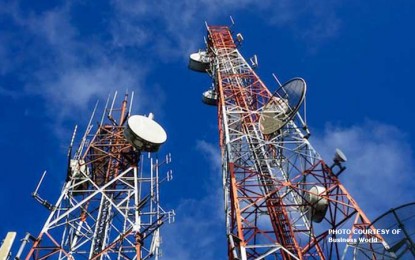News
Telcos able to improve services after Duterte warning: NTC

The National Telecommunications Commission (NTC) on Tuesday said the Philippines’ major telecommunication companies were able to improve their services since President Rodrigo Duterte issued a warning to “shape up or ship out”. (PNA File Photo)
MANILA – The National Telecommunications Commission (NTC) on Tuesday said the Philippines’ major telecommunication companies were able to improve their services since President Rodrigo Duterte issued a warning to “shape up or ship out”.
NTC Commissioner Gamaliel Cordoba, during a Malacañang presser, said the country’s average fixed broadband speed increased from 25.07 Mbps in July 2020 to 28.69 Mbps in November 2020, four months since President Duterte issued his warning.
The mobile download speed also rose from 16.95 Mbps in July 2020 to 18.49 Mbps in November 2020.
“So far po, based on third party audit at saka iyon pong pag-test sa kanila, gumanda naman po ang kanilang serbisyo, nagkaroon po ng improvement tayo (So far, based on our third party audit and their tests, the services improved),” he said during a Palace presser on Tuesday.
Cordoba attributed this increase on internet speed to Duterte’s “political will” and close cooperation among different government agencies, adding that the chief executive’s recent pronouncement paved for more than 100 percent increase in the issuance of construction permits to telecommunication companies.
In 2019, the average permits released per month were around 63 for Globe and 50 for Smart.
From July to November 2020 alone, the permits issue to Globe increased to about 371 monthly, 590 percent up from the same period last year.
For Smart, an average of 95 permits per month were issued, almost 200 percent higher from last year.
“Dahil po iyan sa pagbaston po ng ating Pangulo at ng DILG at iba’t ibang ahensiya (That’s because of the President, the Department of the Interior and Local Government, and other agencies),” he said.
With the increase in the issuance of construction permits, more towers were built. To date, Cordoba said the Philippines has around 22,405 towers.
But for both Smart Communications Inc. and Globe Telecom Inc., the work doesn’t stop here as both cited plans for 2021 to further provide better services to their customers.
“We had actually just finished our budget session for next year and we will continue to invest for sure in fiber and also in our wireless coverage,” Smart Communications Inc. chief Al Panlilio said.
Globe Telecom Inc. President Ernest Cu, on the other hand, said the company hopes to spend about PHP70 billion in 2021, which will account for one million fiber lines across the country.
“We want to aggressively rollout 5G in more municipalities. Hindi rin namin kinalimutan ang mobile, alam ko importante na ma-fix sa tao pero importante rin ang mobile because as they go out and resume their daily lives, babalik na naman ho ang kanilang increase usage in the mobile network instead of the home (We won’t forget the mobile also because we know how important this is to the public’s daily lives),” he said.
READ: Improve your services by December, PRRD to telcos
In his fifth state of the nation address last July 2020, Duterte said he would take “drastic steps” against Globe Telecom Inc. and Smart Communications Inc., the wireless arm of PLDT Inc., if they do not improve by yearend.
Cordoba, for his part, said the public can expect more improvements by 2021 once DITO starts its commercial operations in March next year.
“So, DITO is very aggressive, so kung mapapansin po ninyo si Smart at saka si Globe ay talaga pong gumastos for the past several years, dahil alam po nila na papasok po itong competitor na based po sa initiative ng ating Pangulo na tinatawag po natin third Telco initiative (So if you’ll notice Smart and Globe spent a lot for the past several years because they know this competitor will come in based on the initiative of our President in what we call third telco initiative),” he said.
Adel Tamano, chief administrative officer of DITO, said the company has already built over 1,900 towers and has completed its testing for 5G calls in Metro Manila.
Converge Chief Operating Officer Jesus Romero, meanwhile, said they already have 3.
5 million high-speed fiber ports and plans to add some 1.8 million ports in 2021.
Romero said that the company is also continuously building its backbone, including a domestic submarine backbone with a bigger capacity.
As of October 2020, the Philippines’ fixed internet speed is ranked 32nd in Asia, bested by other Asean states such as Malaysia, Laos, Vietnam, Thailand, and Singapore. On mobile broadband, it’s ranked 34th out of 50 states and territories in Asia.





















